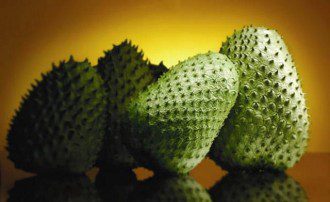Contributing Writer for Wake Up World
Guanabana is known by a variety of names — including soursop, cherimoya, custard apple, Brazilian paw paw and graviola. However you recognize this versatile tree, one aspect is clear: guanabana provides powerful relief from a wide scope of disease. Tackling cancer, herpes, parasites, infections and more, guanabana is an important player in the battle against ill health.
A natural, inexpensive and effective treatment for cancer — and just about everything else:
Revered for centuries in South America and Southeast Asia, the bark, leaves, root, seeds and fruit have been used to tame heart disease, asthma, liver issues and arthritis. Guanabana is also helpful for treating sleep disorders, fevers and cough. According to the article, “Guanabana – Medicinal Uses?” extracts of the plant:
• Attack cancer safely and effectively with an all-natural therapy that does not cause symptoms associated with conventional therapies (ie. nausea, weight loss and hair loss).
• Protect the immune system.
• Boost energy and outlook on life.
• Effectively target and kill malignant cells in 12 types of cancer — including colon, breast, prostate, lung and pancreatic cancer.
• Proved to be up to 10,000 times stronger in slowing the growth of cancer cells than Adriamycin, a commonly used chemotherapeutic drug.
• Selectively kill only cancer cells, unlike traditional chemotherapy treatments.
As far back as the 1970s, the National Cancer Institute (NCI) investigated the merits of guanabana, and discovered the stems and leaves of the tree were successful in destroying cancer cells. “Inexplicably, the results [of the NCI research] were published in an internal report and never released to the public. Since 1976, guanabana has proven to be an immensely potent cancer killer in 20 independent laboratory tests, but as of now, no double-blind clinical trials,” reports Christopher Lane, Ph.D., in Psychology Today.
Moreover, this study found that a compound derived from the leaves of guanabana was “selectively cytotoxic for the lung (A-549), colon (HT-29), and pancreatic (PACA-2) cell lines with potencies equal to or exceeding those of Adriamycin.” And research in the Journal of Natural Products discovered that extracts of guanabana demonstrated pesticidal, antimalarial, antiviral and antimicrobial properties. Likewise, Memorial Sloan Kettering Cancer Center states that guanabana shows anti-inflammatory and anticancer effects in vitro and in vivo.
How to reap the benefits of guanabana
If you would like to enjoy the health-affirming perks of guanabana, making a tea from the leaves is a good place to start. Select 2-3 leaves (either fresh or dried) and cut into small pieces. Place in a heat-proof cup, add 1 1/2 cups boiling water, cover and steep for 30-45 minutes. Strain and sweeten to taste with stevia or raw, local honey.
*A word of caution: Excessive consumption of guanabana can lead to neuronal dysfunction and degeneration with symptoms similar to Parkinson’s disease. Consult with a qualified practitioner before taking guanabana on a daily basis.
Article Sources
- http://www.mskcc.org/cancer-care/herb/graviola
- http://www.ncbi.nlm.nih.gov/pubmed/18598079
- http://www.psychologytoday.com
- http://www.ncbi.nlm.nih.gov/pubmed/8946744
- http://degraviola.com/guanabana
Previous articles by Carolanne:
- Common Toxin in Your Pantry Causes Obesity, Diabetes, Infertility… and Much More
- Is Mold Making You Sick?
- Hemp – The Ultimate Cash Crop, Health Food and Environmental Savior Rolled Into One
- Slash your Organic Food Bill by Almost 90 Percent with This One Simple Method
- Confirmed by Science: You Really Can Change Your DNA – Here’s How
- Chemtrails: Learn How to Protect Yourself From These Treacherous Poisons
- Top 10 Food Frauds: Formaldehyde, Plastic, Melamine & Caustic Soda Found in Common Foods
- Autistic Boy With Higher IQ Than Einstein Discovers Gift After Removal From State-Run Therapy
- Enhance Spiritual, Mental and Physical Well-being with a Pineal Gland Detox
- Enterprising Community Aims for Total Food Self-Sufficiency with Free Edible Landscapes
- The Silent Toxin in Food that Provokes Cancer, Diabetes, Multiple Sclerosis and More
- DIY $2 Self-Watering Garden Bed – Grow Produce Easily, Even in the Toughest Drought Conditions
About the author:
I’m Carolanne — a writer, chef, traveler and enthusiastic advocate for sustainability, organics and joyful living. It’s good to have you here. If you would like to learn more, connect with me at Thrive-Living.net or visit Twitter.com/Thrive_Living.
If you've ever found value in our articles, we'd greatly appreciate your support by purchasing Mindful Meditation Techniques for Kids - A Practical Guide for Adults to Empower Kids with the Gift of Inner Peace and Resilience for Life.
In the spirit of mindfulness, we encourage you to choose the paperback version. Delve into its pages away from screen glare and notifications, allowing yourself to fully immerse in the transformative practices within. The physical book enriches the learning process and serves as a tangible commitment to mindfulness, easily shared among family and friends.
Over the past few years, Wake Up World has faced significant online censorship, impacting our financial ability to stay online. Instead of soliciting donations, we're exploring win-win solutions with our readers to remain financially viable. Moving into book publishing, we hope to secure ongoing funds to continue our mission. With over 8,500 articles published in the past 13 years, we are committed to keeping our content free and accessible to everyone, without resorting to a paywall.
Please note: this article was first published on Natural News. This article is not intended to provide medical advice, diagnosis, or treatment.








